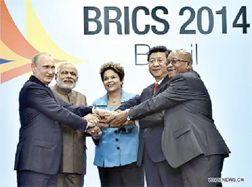Intro: The bank will be called New Development Bank,
a name suggested by PM Narendra Modi.?

The just concluded sixth BRICS- Brazil, Russia, India, China and South Africa – summit marked a significant development towards greater economic integration and cooperation among BRICS states. The annual diplomatic meeting of the BRICS held in Fortaleza, Brazil from July 15-16, 2014 has been said to be quite successful in fostering multilateral ties among involved states.
The Summit was convened to inaugurate the second cycle of BRICS Summits under the theme, “Inclusive Growth: Sustainable Solutions”. This was in line with the inclusive macroeconomic and social policies carried out by the respective governments with the imperative to address the challenges posed to humankind by the need to simultaneously achieve growth, inclusiveness, protection and preservation.
The summit assumes significance as it took place at a time when the World is facing economic and political turmoil. The ill-effects of global financial crisis are still not over; Russia and United States (US) are at odds on the issue of Ukraine crisis; and, Iraq is facing conflict and human crisis, and is heading towards civil war with US showing less inclination to play a pro-active role to end this conflict which is causing instability in many key regions.
The challenges of tackling poverty, making growth more inclusive, and evolving a sustainable model of development have thus become all the more challenging. No doubt, these issues were there before the BRICS leaders earlier. But this time, in the just concluded summit significant development on some important issues have been made.
The most critical achievement has been an agreement on the issue of establishing a $100 billion development bank and a currency reserve pool toward reshaping the Western-dominated international financial system. The bank, aimed at funding infrastructure projects in developing nations, will be based in Shanghai, China, and India will preside over its operations for the first six years, followed by five-year terms for Brazil and then Russia, leaders of the five-country group announced at the 6th BRICS.
The bank will begin with a subscribed capital of $50 billion divided equally between its five founders, with an initial total of $10 billion in cash put in over seven years and $40 billion in guarantees. It is scheduled to start lending in 2016 and be open to membership by other countries, but the capital share of the BRICS, as agreed upon, cannot drop below 55 percent. The contingency currency pool will be held in the reserves of each BRICS country and can be shifted to another member to cushion balance-of-payments difficulties.
It provides a key financial instrument in the hands of BRICS states as its successful functioning will enhance their possibilities to contain the volatility faced by diverse economies as a result of the tapering of the United States” policy of monetary expansion. In addition, it will be “source of capital” for BRICS states to meet out their development needs, and more particularly infrastructural demands.
In his speech Russian President Vladimir Putin announced a BRICS university, which would provide online courses. Indian Prime Minister Narendra Modi stated that “Popularizing our languages through dedicated BRICS language schools in all BRICS countries could be a beginning in this direction”. He emphasised on encouraging engagement between our states, cities and other local bodies, calling for BRICS to be driven by “people-to-people” contact and the youths to be the leading force. There was also a proposal from Russian side for an energy alliance for BRICS nations, under which a Fuel Reserve Bank and BRICS Energy Policy Institute could be set up. If it bears fruition, this could be a milestone to address energy security concerns of BRICS states and reduce their country specific imports at the cost of exchequer. To the advantage of India, a joint declaration issued at the end of the Summit said BRICS reiterate the call for urgent UN Security Council reforms that would allow greater representation from the developing world.
-Abhishek Pratap Singh? (The writer is a research scholar, School of International Studies, Jawaharlal Nehru University)?













Comments